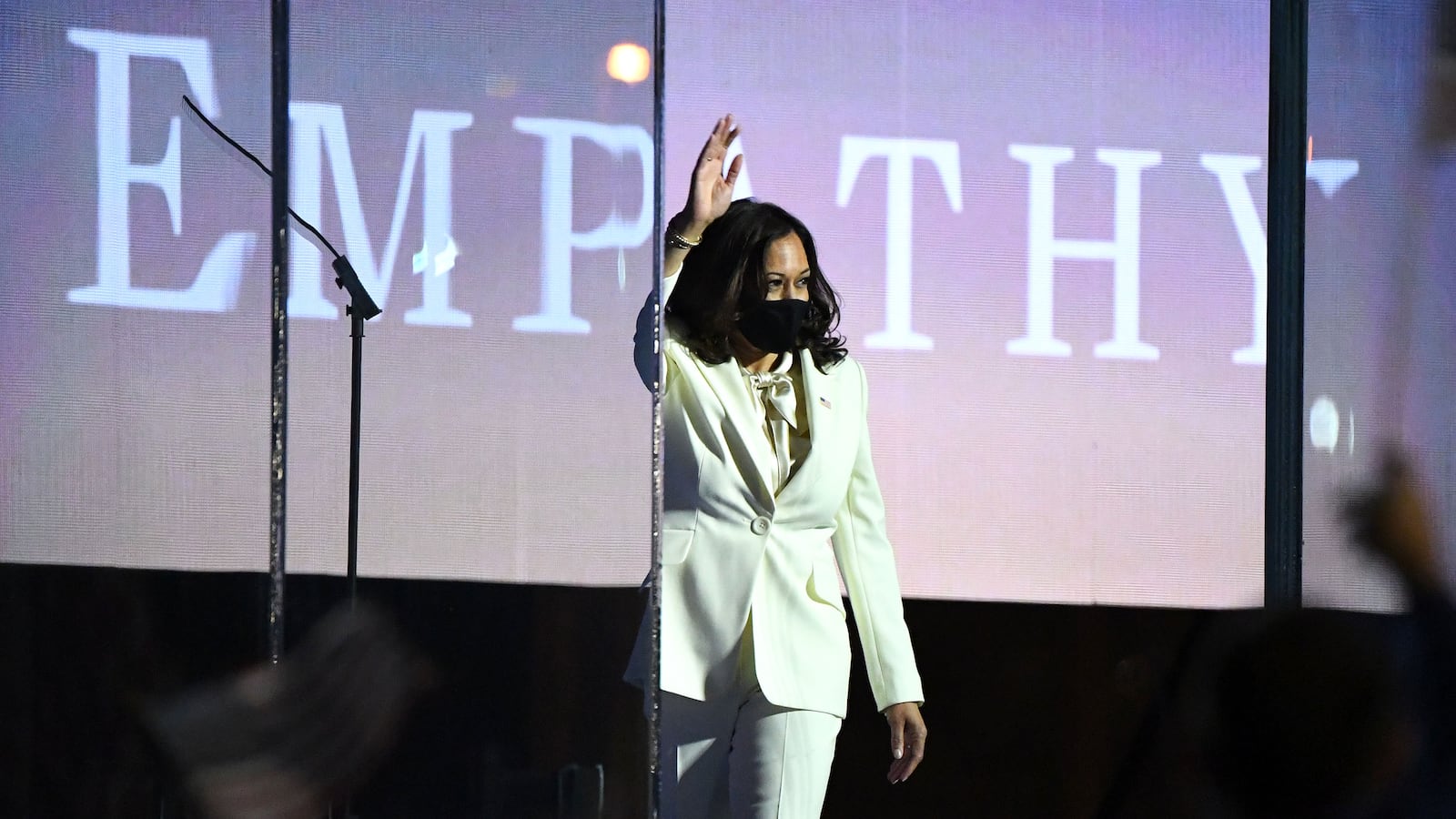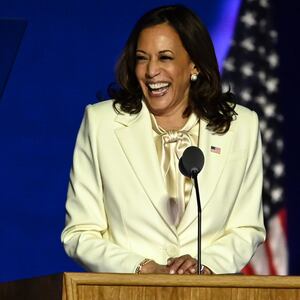As I watched Vice President-elect Kamala Harris step onto the brightly lit stage, I could only imagine how my mother’s sister would have met this moment. Aunt Gerry lived a life with few aspirations and tonight, as the night fell on Wilmington, Harris spoke to all of them. Her brief yet joyful remarks answered our collective call, including women like Geraldine Robinson Ross, who all too often toil in the shadows to eke out a living for their families. They are women who navigate the confines of gender inequity to pave a better way for themselves, their families and their communities.
A former San Francisco district attorney and Howard University alum, Harris was the first Black woman to serve as California attorney general. In 2016, she became only the second woman of African descent elected to the U.S. Senate. And on Saturday night, as she readies herself to take her place as the chief deputy to the next leader of the free world, Harris embraced her role as a model for women and girls around the globe.
My only regret is that now, lulled by pain medications and sedatives in a hospice bed, Aunt Gerry is unable to witness these moments. Nearing death’s door, she was too sick to cast a ballot. Be it hours or days, my 87-year-old aunt will pass on. The road has been long, but her going is as predictable as the morning sun.
Amid end-stage congenital heart failure, her maladies are many. When pneumonia took root in her left lung and her kidneys shut down two weeks ago, she understood that her hour was near. She tearfully phoned her pastor to pray. Doctors took her off the ventilator last Friday, a decision codified in a “Do Not Resuscitate” order she signed last spring. She called for her baby sister Mary Alice—my mother—to come home to St. Louis.
Aunt Gerry does not want to die alone.
Born in Cairo, Illinois, in December 1932, her beginning was fraught with terror. Her parents, Joseph and Alice, fled Arkansas by train, literally running from a white man’s noose when they stopped in that southern Illinois town. They stayed long enough for my grandmother to give birth to her first surviving child. That baby, my Aunt Gerry, is gratefully still with us tonight. Though it’s tough to see her this way.
Growing up, voting was nothing short of an obligation and my aunt—the woman who raised me with stops and starts from an infant—always got dressed up. I used to watch her put on nice stockings, a double-latched girdle and a slim-fitting dress. She loaded us into Grandma Alice’s old white Buick and drove us up to the polling station off State Street. The youngest of our generation, I sat up front and always on somebody’s lap as she picked up relatives and friends. Her cousin, Calvin Humphries, was the precinct captain back then. He lived around the corner on Pennsylvania Avenue and ran his van like a combat sortie on Election Day. One year, when newly elected Chicago mayor Harold Washington came to East St. Louis, he and Aunt Gerry were both on the ad hoc welcome committee.
Every Sunday morning—sometimes twice or thrice—she ferried us to church at Mt. Paran Missionary Baptist over on 14th and Missouri Avenue. It was always supposed to be that way: God, Aunt Gerry, and me.
“Weeping may endure the night,” she used to say, “but joy comes in the morning.”
I am tearful tonight. There may not be another morning for Aunt Gerry and she cannot witness this moment. I started writing her obituary yesterday. I’ve been the designated scribe for our family’s elders since I was 14. This one, though, is harder than the others if only because Aunt Gerry kept notes about what she wanted said and done in her passing. I haven’t had the heart to read them yet.
Her handwriting is so very perfect—as perfect as the remarks Harris rendered in Delaware tonight. Entering to the sounds of Mary J. Blige and the blare of honking horns, Aunt Gerry would have been proud of the way the nation’s first woman and Black vice president met her moment. Radiant and dressed in a suffrage white suit, silk blouse and pearls, she opened her remarks at the Chase Center by quoting the late congressman John Lewis.
“Democracy is not a state,” Harris said, quoting the civil rights icon, “It is an act.
Harris said, as Lewis and Aunt Gerry knew, that this republic is only as strong as our willingness to fight for it. She gave voice to our history of sacrifice, courage, and resilience and the generosity of spirit. The soul of America, she said, was at stake on November 3. The voices of more than 140 million Americans have been heard—more than have ever before voted in any previous presidential election.
Make no mistake, it took audacity for Joe Biden to choose her. The daughter of a Jamaican father and Indian immigrant mother, Harris reminded us that it has been only 100 years since the 19th Amendment and a mere 55 since the Voting Rights Act was signed into law. Even so, hers was a hopeful address, steeped in joy and gratitude. I noted her subdued tone as she paid homage to her mother, Shyamala Gopalan Harris, who came to these shores at just 19.
Harris’ election comes, I know, amid national upheaval. And some hearts, though certainly not mine, are broken. Our country continues to grapple with its history of racial and social injustice. Still, Harris proclaimed, “I will not be the last.”
Foundationally, despite the errors of our birth and the tragedies that befell my grandparents as well as those who came before and after them, we are stronger than the moral failings of any individual. Harris never uttered his name tonight, but Donald Trump could never have met this moment. For the record, Aunt Gerry despised him.
I knew, as Aunt Gerry did, that we would one day turn the page and move on—move on to progress, move on to healing, move on to an America who sees herself for what she is: full of the promise and possibility Aunt Gerry believed in. Our concessions have been many, our stumblings myriad. However, this is about more than a man—even a mendacious, self-aggrandizing, would-be authoritarian.
Joy does come in the morning. And now, as we prepare to lay Aunt Gerry to rest, my heart is full. This, I know, is about the whole of us.







